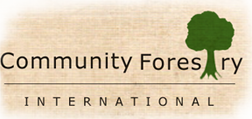Location
Community Forestry International
CFI projects support forest dependent communities as sustainable managers of the world’s forest ecosystems. CFI empowers forest communities through legal, institutional, technical and financial strategies at the village, national, and global level. With the advent of recent carbon trading markets that provide financial incentives for Reducing Emissions from Deforestation and Forest Degradation (REDD), CFI is involved with helping to support community-based REDD projects to alleviate poverty and increase greater sustainability of forest resources.
Working collaboratively with villagers, technical organizations, local and national governments, scientists, policy makers and donors, CFI creates innovative partnerships to design, field test, and implement innovative community forest management systems, replicate them to other sites and use the learning and experience to inform national and international policies. CFI views community forest stewardship as an important approach to stabilizing the earth’s natural forests, adapting to change in climate, and providing important environmental services.
To view CFI’s Annual Report for 2013, click link: Annual Report
Members:
Resources
Displaying 1 - 5 of 5Land for my grandchildren: land-use and tenure change in Ratanakiri 1989-2007
This paper draws on case studies from three communities in Ratanakiri to illustrate
Legal analysis of forest and land laws in Cambodia
From the foreword: "A major goal of CFI's mission in Cambodia is to support the involvement of civil society in the management of forests. Rural communities have a special role to play as forest stewards, both due to their logistical proximity to natural forests, but also because of their dependency upon these resources for shelter, water, fuel and food.
Protecting land rights in Ratanakiri, Cambodia
Community Forestry International trained and educated energetic extension workers, both young and old, from the indigenous Tampuan, Jarai, and Kreung tribes of Ratanakiri province. They are now part of an indigenous peoples’ network that is dedicated to protecting the land and forest rights of the unique indigenous communities of Ratanakiri province.
Natural resources management networking in Cambodia status, lessons learned, and future possibilities
The report introduces most of the existing natural resources management (NRM) networks in Cambodia and analyzes some of the general issues related to networking in Cambodia. The overall objectives of this report are to: Introduce some of the existing NRM networks in Cambodia; describe some of the existing general practices for network management and operation; explore some of the cultural and gender issues related to networks; identify the challenges and successes of existing NRM networks and suggest some recommendations for the future.
Protecting Land Rights in Ratanakiri, Cambodia
Ratanakiri is divided into 9 districts covering 240 villages and approximately 100,000 people. Of these,
65% are minority hill tribes comprising groups such as the Jarai, Tampoen, Kui, etc. with only about 5% of the people literate. Over the past five years, international monitoring groups estimate that 120% of the land has been appropriated through land sales and concessions for logging, mining, and commercial agriculture.


